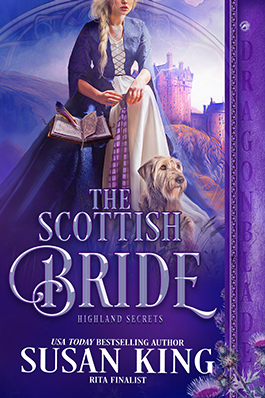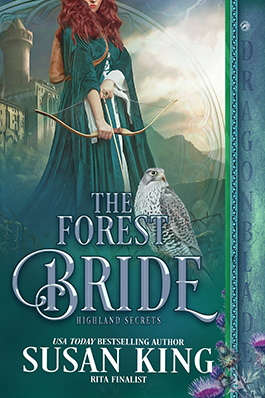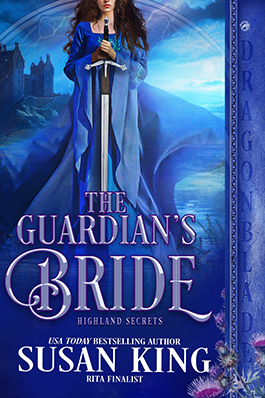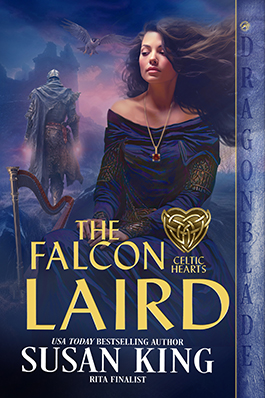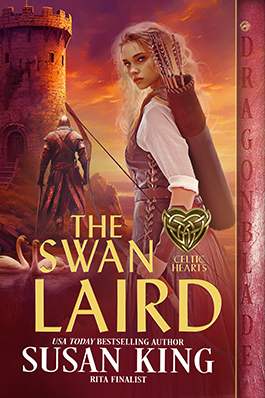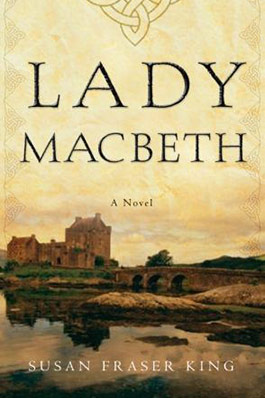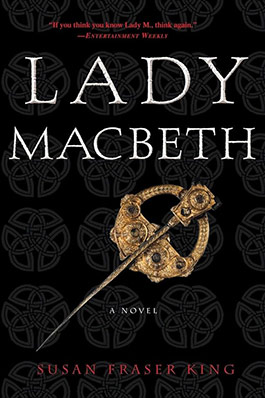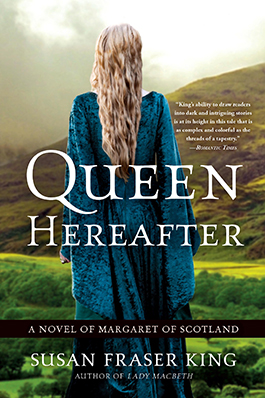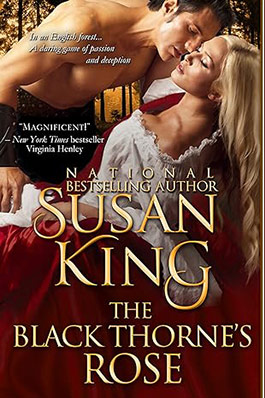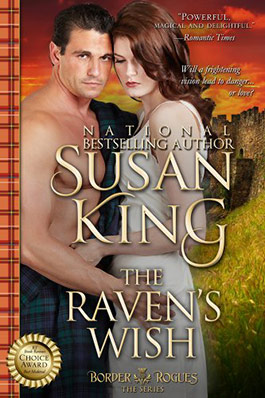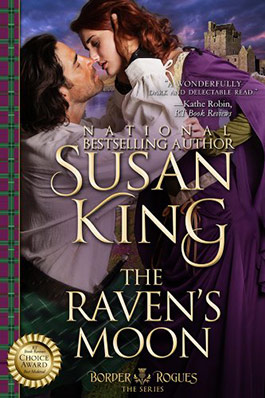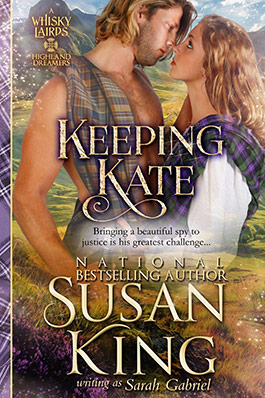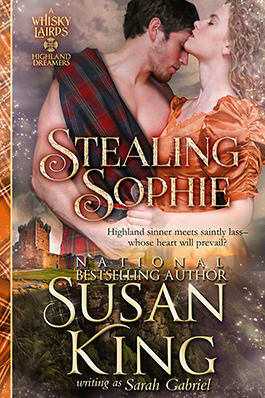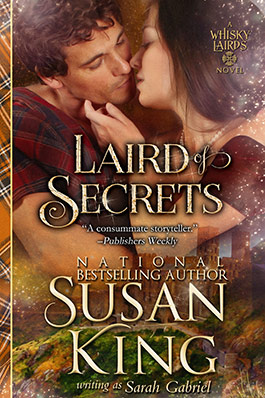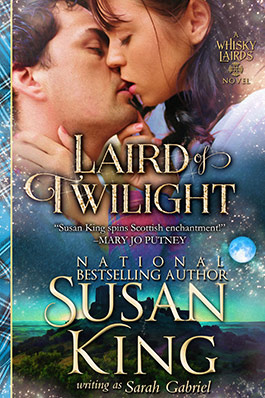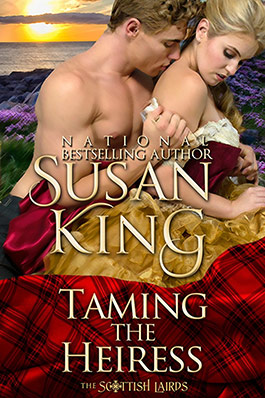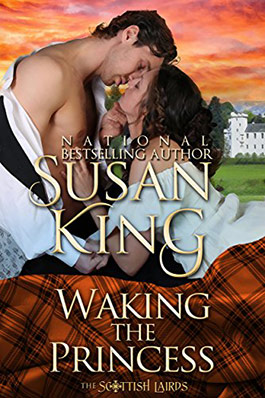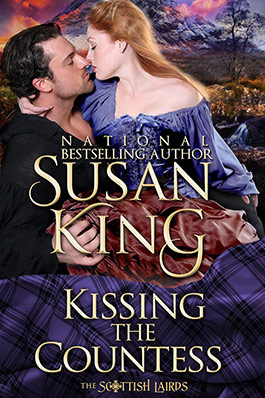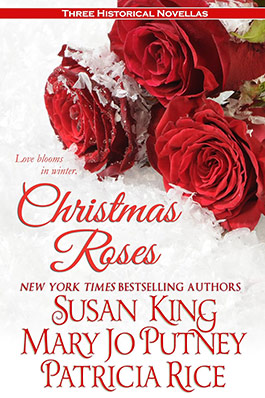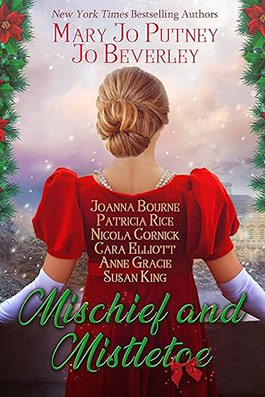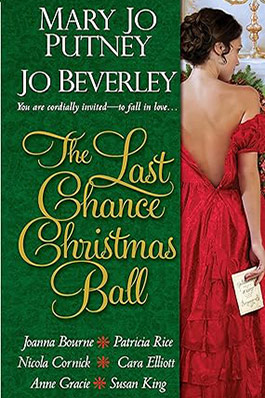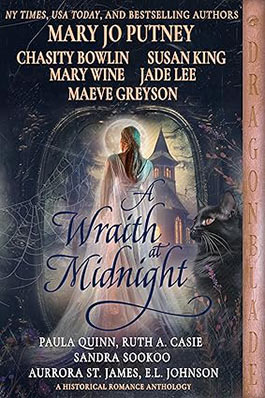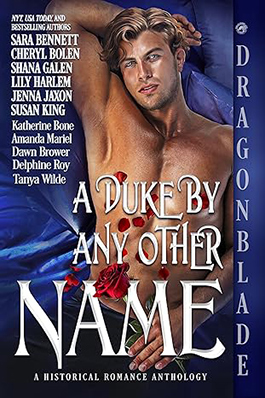Laird of Rogues
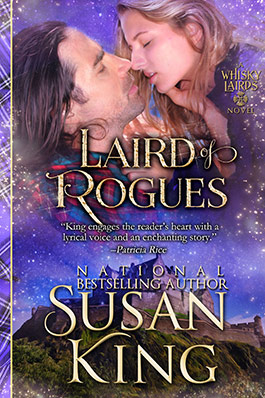
A Celebrated Smuggler and Whisky Distiller Must Choose Between Love and Freedom in Laird of Rogues, a Scottish Historical Romance from Susan King
—Scotland, 1822—
When King George IV visits Edinburgh, he expects to meet the distiller of Glenbrae, his favorite whisky. So the city’s deputy lord provost, Sir Hector Graham, acts quickly to release Ronan MacGregor, Laird of Glenbrae—one of the falsely accused Whisky Lairds—from the castle dungeon to tidy him up for the royal occasion. The provost expects his daughter, who speaks Gaelic, to teach the Highlander some English and manners. What the provost doesn’t know: the notorious smuggler is, in fact, a polished lawyer from Perth.
Ellison Graham, Sir Hector’s widowed daughter, sets out to transform the rough and rugged Highlander into a gentleman, only to discover he is indeed bred to the peerage, has no intention of meeting the king—and has begun to steal her heart.
Sequestered at a Highland estate with Ellison, Ronan continues the ruse while doing his utmost to help his kinsmen and save his whisky business. He never expects to fall in love with the captivating widow—a secret writer of sensational adventure fiction who longs for some passion and adventure of her own.
Ronan’s most guarded secret could bring him a viscountcy but ignites a bitter rivalry that threatens his whisky enterprise and soon endangers the woman he loves. Now Ellison must find the courage to face her fears—and Ronan must choose between coveted freedom and protecting the love that could change his life forever…if only he can stay out of the dungeon.
"Laird of Rogues is a wonderful story, filled with all my favourite ingredients – handsome kilted Highlanders, whisky smugglers, intrigue and forbidden love, all set against the stunning backdrop of Scotland, and with a hint of fairy magic. I was thoroughly enchanted and fell completely in love with the hero, rooting for him and the heroine all the way. A brilliant read that kept me on the edge of my seat!"
~ Christina Courtenay, author of Shadows in the Ashes
Edinburgh dungeons, June, 1822
“Tea,” the guard called as he pushed a wooden cart, china and silverware rattling on a small tray, into the prison cell. “Tea and visitors!”
Ronan MacGregor closed the book he was reading and sighed, glancing at his companions in the cell, who sat up slowly; Iain MacInnes and Arthur Stewart had both been dozing. All of them were weary of the Edinburgh dungeon and their ruse as the Highland scoundrels known as the Whisky Lairds. But that guise protected their identities, their kin and glen folk too. Soon Ronan and his friends would return to their lives and livelihoods—if luck was with them.
At least their stay here had improved when Edinburgh officials saw the advantage in allowing summer crowds to view the notorious smugglers—for a fee.
These weeks had given him much to consider, making him even more determined to push for better justice for Highland folk too often regarded as common, uneducated, unworthy. The ancient culture of the Gaels, their pride, their legacy, deserved appreciation and preservation. Once he was free to practice law again, he would promote the truth. But for now, the ploy must continue.
“Hey,” Iain MacInnes murmured. “The angel is here again.”
Ronan looked toward the door. She was there, setting gentle foot on stone, crossing the straw as if floating—a vision in lavender trimmed in black lace, dark bonnet curving around her head, a few golden curls escaping. This was indeed the young woman who had visited the prison cell just days ago. The gentleman who had accompanied her that day was back as well.
Ronan stood, as did his friends, in expectant silence.
The gentleman stepped forward. “I am Mr. Adam Corbie, secretary to the Deputy Lord Provost of Edinburgh.” He was a slight man, sandy and plain. The curl of his lip matched his sneering tone.
The young woman translated into Gaelic, not realizing it was unnecessary; the three Highland prisoners were believed to speak little English.
“This is Mrs. Graham-Leslie,” Corbie went on. “She will speak with you briefly. You will show decent manners in her presence, or the guards will be on you directly.” Mrs. Graham-Leslie translated, cheeks turning pink.
Corbie huffed and looked at her. “They do not have a word of proper English.”
“It is possible they understand some. Mr. Corbie, please wait outside. I need just a few minutes.” She shooed him away with a gloved hand.
Ronan pinched back a smile. Corbie seemed oblivious to her subtle impatience with him.
Stepping outside, Adam Corbie stood close to the iron grating to watch them. The young woman smiled as if she had just arrived at a garden party. As she moved, a floral and vanilla scent wafted lightly over the dungeon’s older, less pleasant odors. In this place, she seemed as delicate and divine as a beam of sunlight in these dank shadows.
“Beannachdan, a dhaoine uaisle,” she said. “Greetings, gentlemen.” Her accent was good, but not native. “You are Mr. MacInnes, Mr. Stewart, Mr. MacGregor?”
Iain bobbed clumsily and Stewart—Lord Linhope elsewhere—made a proper bow. “Fàilte,” he welcomed her in Gaelic. “A pleasure to meet you.”
The good doctor stopped short of kissing her hand, Ronan noted sourly, and for his turn, only nodded in silence.
“I am pleased to meet you.” Her smile was as impish as it was angelic, with fleeting dimples. A devastating sight in this sorry place, Ronan thought. She was petite, with lush curves and graceful bones, and a serene air that held a thread of steely determination. The effect took him down swiftly, though he gave nothing away.
“May we offer you tea, Mrs. Graham-Leslie?” Linhope asked in Gaelic.
“Keep your distance, sir,” Corbie growled, watching like a hawk beyond the bars.
“Miss Graham will do,” she said. “I am widowed and do not use my married name.”
Ronan raised a brow. He knew some Scotswomen kept their maiden names. Yet this girl from an aristocratic family in the city made an unusual choice; the status of widow could reap benefit in social circles.
“Miss Graham.” Linhope indicated a bale of straw. “Would you care to sit?”
She tipped her bonneted head, a golden curl slipping free. Ronan savored the rare sight of beauty and grace, so extraordinary in this dreary underworld. Yet she seemed at ease, almost as if she enjoyed it.
He narrowed his eyes. Why was she here, and what did she want?
She picked up the teapot. “Am bu toil leat tì? Do you want tea?”
Iain and Linhope both thanked her. She began to pour into three cracked cups.
“Cha toil leam tì,” Ronan said. I do not want tea. He folded his arms petulantly, but only against the damnable effect she was having on him. Her mere presence, this delicate wee widow who tossed her suitor out and bravely faced three accused criminals, softened his hard reserve. He liked tea; what he disliked was a breach of his emotional barricade.
Linhope shot him a dark glance. Behave, it said.
Ignoring Ronan, she poured tea and served cakes as if the cell was a parlor in a fine mansion. The little cakes were studded with currants. Likely stale as a rock, he thought.
Iain and Linhope accepted cups and cakes, and the girl offered a cup to Ronan too. He took it, though declined the cake. What did this pretty visitor want? Instinct told him to hide his fine upbringing and his ease with teacups and manners and lovely ladies pouring for gentlemen. The same instinct told him to keep to the Gaelic and play the simple crofter.
He glanced at his companions to remind them of that, but they were too besotted to notice. Linhope sipped, Iain slurped, both smiled. Ronan held his cup and scowled.
“Now,” Miss Graham said, balancing her teacup prettily in white-gloved hands, “which of you is Glenbrae?” Startled, Ronan said nothing, but Iain pointed. “That’s him.”
“I am from Glenbrae,” Ronan emphasized in Gaelic, shooting a sight-dagger toward Iain for good measure. The fellow missed it, content as a happy pup.
“Mr. MacGregor—Glenbrae—may I have a word with you?”
“Me?” His surprised retort slipped out.
“If you please,” she said in all her angel brightness. She moved toward him, barely coming to his shoulder. He looked down at her. Too close. Stepped back.
“What is it, Miss Graham?”
“It is Mr. Ronan MacGregor? Of Glenbrae? Is that correct?”
He paused. His baptized name was John Ronan MacGregor; as a lawyer, he was John R. MacGregor. Ronan was used by kin and friends—and the justiciary court at present.
“What do you want of me?” he asked stiffly.
“I have your welfare in mind with only good intentions. I was sent by my father.”
Ah. There it was. “We do not need saving by heaven’s grace. Goodbye, Miss.”
“Oh! Not that!” She nearly tilted the cup in her hands. “My father is the Deputy Lord Provost of Edinburgh. Sir Hector Graham. He sent me here to bring you a message.”
Ronan frowned. “Why would a father send his daughter to such a place?”
“He cannot be seen with you himself, you understand. And I offered to translate.”/
“Miss Ellison, are you done?” This from Corbie at the grate.
“Not yet,” she called, adding in Gaelic to Ronan, “I trust I am perfectly safe here.”
He bent slightly. “You are safe, madam,” he replied softly. “But do not try to change me with charitable intentions or a churchy mission—or try to convince me of your father’s demands if he will not face me but sends a slip of a lass in his stead.”
“Change you and convince you?” She looked up. “But Mr. MacGregor, that is precisely what I mean to do.”/









